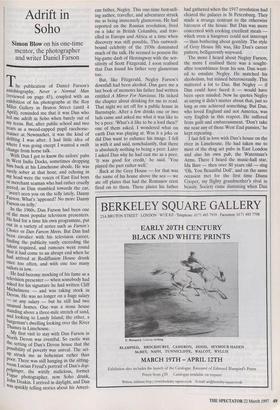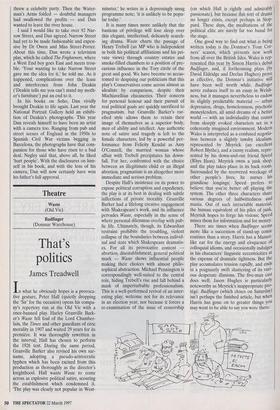Adrift in Soho
Simon Blow on his one-time mentor, the photographer and writer Daniel Farson The publication of Daniel Farson's autobiography, Never a Normal Man (reviewed on page 45), coupled with an exhibition of his photographs at the Roy Miles Gallery in Bruton Street (until 4 April), reminded me that it was Dan who led me adrift in Soho when barely out of ray teens. But, after public school and two years as a tweed-capped pupil racehorse- trainer at Newmarket, it was the kind of drifting I was after. I had little idea of where I was going except I wanted a swift change from horse talk.
With Dan I got to know the sailors' pubs m West India Docks, sometimes dropping him back at his Limehouse abode. He was rarely sober at that hour, and echoing in my head were the voices of East End boys or merchant seaman who had rather cruelly Jeered, as Dan stumbled towards the car, aven't seen you on the telly lately, Danny Farson. What's 'appened? No more Danny Farson on telly.' In the 1960s, Dan Farson had been one of the most popular television presenters. He had for a time his own programme, put out in a variety of series such as Farson's Choice or Dan Farson Meets. But Dan had been cavalier with his television career, finding the publicity vastly exceeding the talent required, and rumours went round that it had come to an abrupt end when he had arrived at Rediffusion House drunk "cc too often, and with one too many sailors in tow.
He had become mocking of his fame as a television presenter — when somebody had asked for his signature he had written Cliff Michelmore — and was taking stock in Devon. He was no longer on a huge salary ---- or any salary — but he still had two unusual homes. One was a stone house standing above a three-mile stretch of sand, and looking to Lundy Island; the other, a bargeman's dwelling looking over the River Thames in Limehouse.
North first visit to stay with Dan Farson in North Devon was eventful. So exotic was the setting of Dan's Devon house that the Possibility of poverty was unreal. The set- up struck me as bohemian rather than Poor. There was still hanging in the sitting- room Lucian Freud's portrait of Dan's dop- Vganger, the wittily malicious, former John photographer, now Soho drunk, olio Deakin. I arrived in daylight, and Dan Was quickly telling stories about his Ameri- can father, Negley. This one-time best-sell- ing author, traveller, and adventurer struck me as being immensely glamorous. He had reported on the Russian revolution, lived on a lake in British Columbia, and trav- elled in Europe and Africa at a time when discovery was still possible. This outward- bound celebrity of the 1930s dominated much of the talk. He seemed to possess the big-game dash of Hemingway with the sen- sitivity of Scott Fitzgerald, I soon realised that Dan found his father very glamorous too.
But, like Fitzgerald, Negley Farson's downfall had been alcohol. Dan gave me a last book of memoirs his father had written • entitled A Mirror For Narcissus. He ticked the chapter about drinking for me to read. That night we set off for a public house in Barnstaple. After a few drinks one or two lads came and asked me what it was like to be a peer, 'What's it like to be a lord then?' one of them asked. I wondered what on earth Dan was playing at. Was it a joke or did Dan want to enhance his image. I fell in with it and said, nonchalantly, that there is absolutely nothing to being a peer. Later I asked Dan why he had cast me as a peer. `It was good for credit,' he said. 'You played the part rather well.' Back at the Grey House — for that was the name of his house above the sea — we ate off plates that had the Romanov crest fired on to them. These plates his father had gathered when the 1917 revolution had cleared the palaces in St Petersburg. They made a strange contrast to the otherwise bareness of the house. But Dan was more concerned with cooking excellent meals which even a hangover could not interrupt — than bothering about gentility. The style of Grey House life was, like Dan's career pattern, belligerently wayward.
The more I heard about Negley Farson, the more I realised there was a sought- after resemblance from his son. Dan want- ed to emulate Negley. He matched his alcoholism, but missed heterosexually. This mattered a lot to Dan. But Negley — if Dan could have faced it — would have been open minded. Now he quotes Negley as saying it didn't matter about that, just so long as one achieved something. But Dan, who loved England and not America, was very English in this respect. He suffered from guilt and embarrassment. 'Don't take me near any of those West End pansies,' he kept repeating.
I fast fell in love with Dan's house on the river in Limehouse. He had taken me to most of the drag act pubs in East London and also his own pub, the Waterman's Arms. There I heard the music-hall star, Ida Barr — then over 80 years old — sing `Oh, You Beautiful Doll', and on the same occasion met for the first time Diana Cooper, my flighty grandmother's rival in beauty. Society came slumming when Dan threw a celebrity party. Then the Water- man's Arms folded — doubtful managers had swallowed the profits — and Dan wanted to leave the river house.
I said. I would like to take over 92 Nar- row Street, and Dan agreed. Narrow Street had yet to be made fashionable and expen- sive by Dr Owen and Miss Street-Porter. About this time, Dan wrote a television play, which he called The Frighteners, where a West End boy goes East and meets trou- ble-. 'Your wanting to take Narrow Street gave me the idea for it,' he told me. As it happened, complications over the lease and interference from John Deakin (Deakin tells me you can't stand my moth- er's furniture') put an end to it.
In his books on Soho, Dan vividly brought Deakin to life again. Last year the National Portrait Gallery held an exhibi- tion of Deakin's photographs. This year Dan reveals himself to have been an artist with a camera too. Ranging from pub and street scenes of England in the 1950s to Spanish Civil War victims begging in Barcelona, the photographs have that com- passion for those who have risen to a bad deal. Negley said that, above all, he liked `hurt people'. With the disclosures on him- self in his book, and with the lens of his camera, Dan will now certainly have won his father's full approval.



































































 Previous page
Previous page